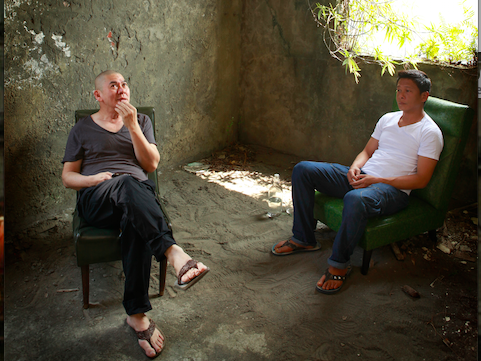Given the breadth of so much modern cinema, many films today are as concerned with what’s outside the frame as with what’s in it. Tsai Ming-Liang is a pleasantly persistent exception. As his previous feature Stray Dogs demonstrated, the Taiwanese director tells his stories entirely within the frame. His method is efficient and theatrical; make the actors move, not the camera. His brand of ‘slow cinema’ may not be to everyone’s taste (as evidenced by its lack of a cinema release in this part of the world), but his films’ simplicity has plenty of admirers. With his latest, Afternoon, comes a real coup. We watch two men sit and talk for two-and-a-quarter hours, and that is it. This one is static, even for Tsai; the camera never pans or moves out of its location. Think My Cuppa With Andre, and you’re getting warm, though Louis Malle’s film is a blockbuster compared to Afternoon’s stillness.”
Afternoon is a simple (or at least, simply-made) exploration of Tsai’s relationship with his muse, actor Lee Kang-Sheng. It’s a relationship that must be based on respect to overcome underlying tensions. For the most part, it plays out like a close father-son dynamic, as they wilfully and playfully acknowledge each other’s pros and cons. The banter between the two is enjoyable and quick-witted, though it may come at the expense of any newcomers to the cult of Tsai (It pays to have at least watched Stray Dogs beforehand). It was always going to be the case that Afternoon is for the faithful, and there’s a lot to enjoy. At one point, Lee complains to Tsai about the length of his takes! The film is peppered with such moments of wry self-reflexivity.
Self-aggrandising as this approach sounds, theirs is a relationship beyond the simple dichotomy of ‘actor-director’. He is not only a common collaborator, but also an object of affection, and even love. The homosexual Tsai admits as much during their conversation (“I feel that you’re God’s greatest gift to me.”), though the heterosexual Lee has clearly heard all this before, and takes the praise with good grace. Indeed, there must be a lot that Lee has had to listen to over the years, because Tsai is a very keen talker. Calling Afternoon a conversation may be a slight misrepresentation, as the director is by far the chattier of the two.
Accusations of this being an extended ego massage might be hard to bat away, a feeling that is not helped by the austerity of the shoot. The entire film consists of just four shots from the same angle, with the director and actor sitting just off centre. The film takes place in the corner of a mud-walled house, with jungle foliage stretching out over the hills outside, but the camera stays put, only cutting to black three times. The film’s content alone ensures it plays strictly into thw wheelhouse of the fans, but this austerity is arguably a burden too far.. Tsai’s method is all over Afternoon, but it has no narrative to drive. As a dissection of either the director’s or actor’s method, it’s not quite as precise or as enjoyable as De Palma, but it has a great deal of warmth, insight and humour to offer. It might not be enough to cover the full 137 minutes, but it comes through in welcome fits and bursts.

